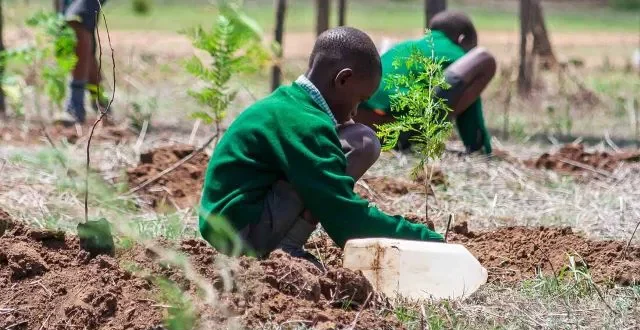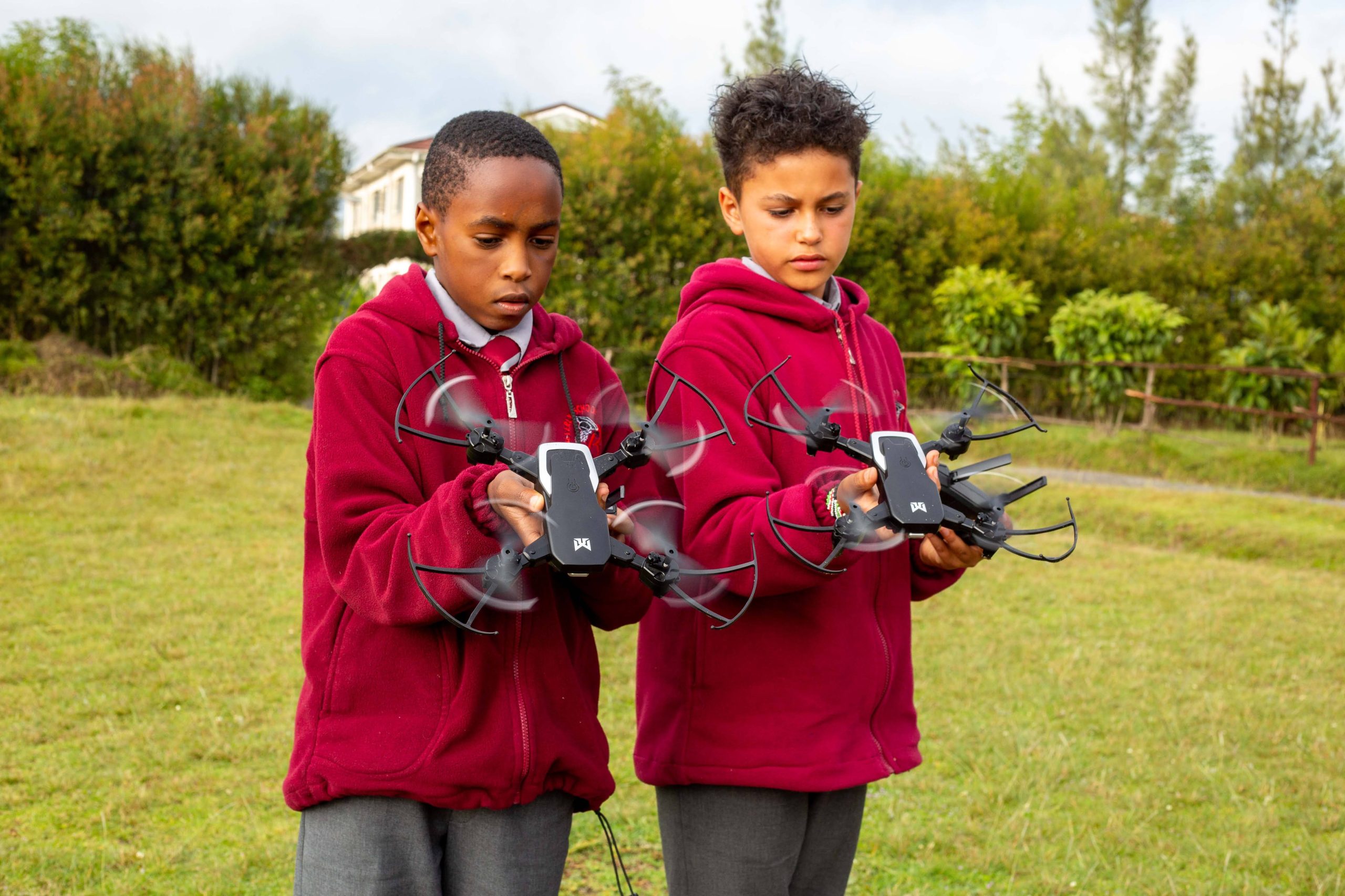Each year, Mazingira Day floods headlines with tree planting and speeches — yet the environment keeps suffering. Kenya’s green celebrations risk becoming mere public relations shows unless real action, community participation, and accountability replace the cameras and slogans.
Every October, Kenya joins the rest of the world to commemorate Mazingira Day—a day meant for environmental reflection, renewal, and responsibility. Across the nation, leaders plant trees, learners carry banners, and corporate sponsor clean-up drives. Cameras flash, speeches flow, and for a moment, the nation appears united in the love of nature. Yet when the ceremonies end, the rivers remain choked with plastic, forests continue to fall, and the seedlings planted for the cameras wither in silence.
What should be a genuine environmental renewal often turns into a public relations ritual—a day of image management rather than earth management.
Symbolism Over Substance
Mazingira Day has become predictable: tree planting, ribbon cutting, photo opportunities, and press statements. While these gestures may symbolize goodwill, they rarely translate into real change. Trees are planted without follow-up, many in unsuitable areas. Within weeks, most are forgotten. True conservation is not about how many trees are planted, but how many grow, survive, and thrive. When symbolism replaces substance, the day loses meaning—it becomes a spectacle of intent, not a demonstration of integrity.
The Media Spectacle: Optics Over Outcomes
In the age of social media, visibility often replaces value. Many institutions are more eager to be seen doing something green than to commit to the hard work of environmental restoration. Television and social media fill with leaders in branded T-shirts, holding shovels long enough for a photo before handing them to aides. Yet the real environmental specialist may not be on television.
ALSO READ:
Pwani Varsity celebrates academic excellence as it marks 13th graduation ceremony
They are the quiet rangers guarding forests from loggers, the teachers nurturing environmental clubs in schools, the youth cleaning rivers, and the farmers protecting riverbanks. Their work is invisible but invaluable. They don’t need microphones or banners—their reward lies in seeing life bloom again where it was fading.
This is the opposite when it comes to the real environmental specialist who does not chase the limelight. They do not speak at conferences or feature in glossy adverts. They work silently, guided by duty, not publicity. They are the men and women recycling plastic into building materials, the elders protecting sacred groves, and the students tending school gardens with patience.
They make every day Mazingira Day. Their work may not trend online, but it sustains the land. If Kenya celebrated them as much as it celebrates officials on stage, environmental protection would move from event to lifestyle.
It is important to note that teachers and learners across Kenya have been planting trees all year long, not just on Mazingira Day. Their consistent effort shows that real conservation does not depend on a calendar. In many schools, trees have grown into living laboratories where children learn responsibility, patience, and care for creation. These everyday acts—quiet, disciplined, and persistent—are far more powerful than a single day of speeches and cameras.
One-Day Passion, 364 Days of Neglect
Kenya’s environmental zeal peaks on Mazingira Day—and fades soon after. Once the banners come down, illegal dumping resumes, forests are encroached upon, and plastic waste returns to rivers. The environment, however, is not a guest to be honored once a year; it is a permanent home that requires daily care. Environmental conservation demands consistency, not ceremony. Until Kenya treats every day as Mazingira Day, the annual celebration will remain a hollow ritual.
When Politics Hijacks Environmental Justice
Mazingira Day has also become a political stage. Leaders use it for speeches and self-promotion. They plant symbolic trees, make lofty promises, and vanish. The day that should demand accountability becomes another occasion for applause. Yet the environment does not need politicians with microphones—it needs policymakers with measurable plans. Progress will only come when politics steps aside and science, ethics, and evidence take the lead.
The Corporate Mirage: Greenwashing in Action
ALSO READ:
Corporate Kenya plays a growing role in environmental activities, often sponsoring events and donating seedlings. Yet beneath the green banners lies a worrying trend—greenwashing. Companies that pollute rivers or produce tons of plastic suddenly appear as environmental champions once a year. True corporate responsibility is not about planting trees for cameras but reducing pollution, reporting carbon footprints, and embedding sustainability in operations. The earth does not need symbolic cheques; it needs systemic change.
Leaving Out the Real Custodians
Many Mazingira Day programs exclude the people who live closest to the environment—farmers, herders, and fishermen. Instead, the events are designed in offices and executed by public relations teams. Yet the communities living near forests, rivers, and wetlands are the true custodians of nature. They understand its rhythms and risks. Real progress begins when local people are not passive participants but active partners in conservation.
No Data, No Accountability
Each year, institutions boast of millions of trees planted, but rarely do we see reports on survival rates or follow-up outcomes. Without reliable data, conservation becomes storytelling. How many trees survived six months later? How many tons of waste were recycled? Transparency turns good intentions into measurable progress. Without it, Mazingira Day remains a parade of promises.
Avoiding the Root Causes
Mazingira Day often focuses on symptoms—littering, waste, and deforestation—without addressing root causes such as weak policies, illegal land grabs, and corruption in resource management. It’s easier to organize a cleanup than to enforce a ban on illegal logging. It’s easier to plant trees than to regulate pollution. But unless we confront the underlying causes, the celebration will continue to mask the real environmental wounds.
Learning from Global Models
Around the world, successful environmental programs are backed by systems, not ceremonies. In Japan, strict recycling laws make every citizen responsible for waste. Germany digitally tracks the growth and survival of trees planted in national campaigns. Rwanda’s monthly Umuganda clean-up exercise integrates civic duty into everyday life. Kenya can draw lessons from such discipline—turning environmentalism from an annual act into a daily ethic.
ALSO READ:
The irony of Mazingira Day wishes: It’s time Kenyan publishers put words into paper
Education: The Seed of Environmental Renewal
The journey to genuine conservation begins in classrooms. Schools should not just teach about the environment—they should live it. Learners can plant and adopt trees, manage waste, and learn the science and ethics of sustainability. Environmental education builds future citizens who act, not just talk. When young people grow up seeing the planet as their shared home, Mazingira Day becomes a way of life, not a date on the calendar.
Faith, Culture, and the Spirit of Stewardship
Long before environmental laws, traditional African societies treated nature with reverence. Forests were sacred, and rivers had guardians. Reviving that moral and spiritual connection can reignite our ecological conscience. Religious institutions, too, can use Mazingira Day to remind congregations that caring for creation is an act of faith. When culture and morality align with science, the planet breathes easier.
From Publicity to Purpose
To reclaim the soul of Mazingira Day, Kenya must move from publicity to purpose. Every event should be followed by a concrete plan, with annual progress reports from counties and corporations. Activities should align with national climate and afforestation goals, and local communities should be central to implementation. Environmental protection cannot depend on photoshoots—it must depend on principles, performance, and persistence.
The Quiet Heroes Among Us
The true heroes of Kenya’s environment are not always recognized. They are the rangers who patrol forests at dawn, the students who pick litter after class, and the smallholder farmers who preserve trees on their land. They work quietly, often without pay or praise, yet they embody the spirit of sustainability. The real environmental specialist may not appear on a poster or television, but their dedication keeps rivers flowing and forests alive.
If our rivers continue to dry, our forests shrink, and our air grow heavy with toxins, no number of branded shirts or speeches will save us. Mazingira Day will only matter when its spirit outlives the cameras—when Kenyans change behavior, institutions enforce laws, and leaders act with integrity. The environment does not respond to applause; it responds to action.
The real environmental specialist may never trend online, but their quiet work nourishes the earth we all depend on. Kenya must now decide: will Mazingira Day remain a show for the cameras, or will it become a covenant with creation—a solemn renewal of our duty to protect the only home we have?
“True conservation is not about how many trees are planted, but how many grow and thrive.”
By Hillary Muhalya
You can also follow our social media pages on Twitter: Education News KE and Facebook: Education News Newspaper for timely updates.
>>> Click here to stay up-to-date with trending regional stories
>>> Click here to read more informed opinions on the country’s education landscape






